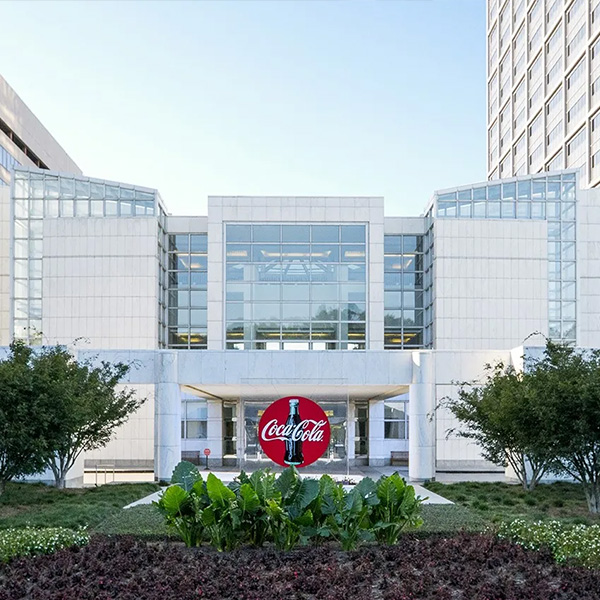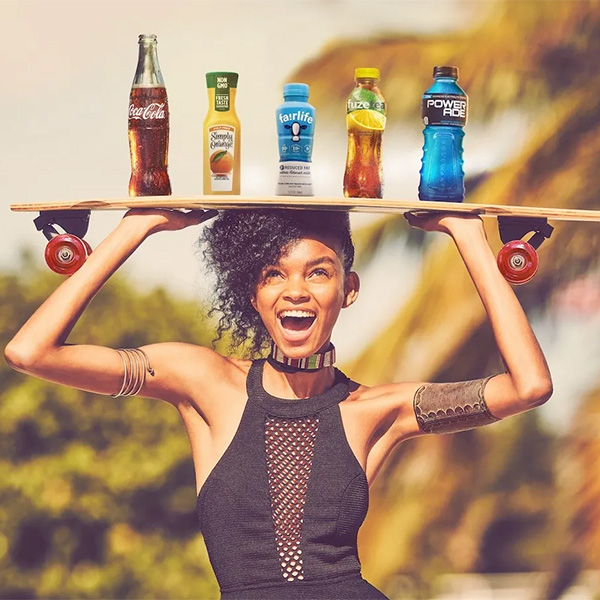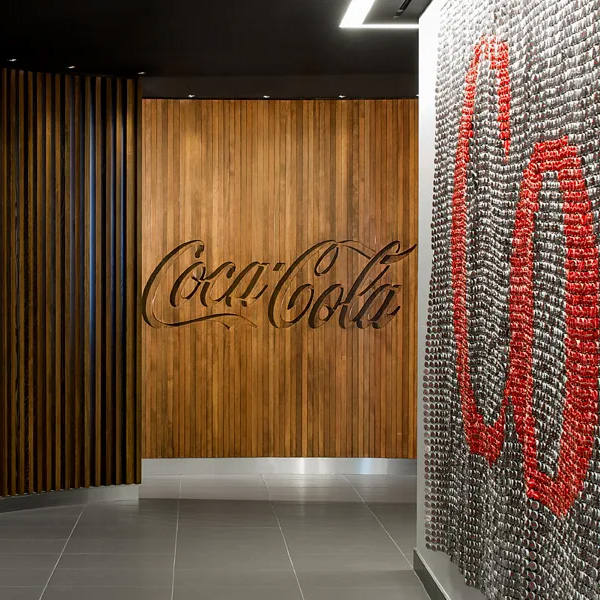Responsible Alcohol Marketing Policy
At The Coca‑Cola Company (TCCC), we are proud to have been building loved brands that offer our consumers the choice of great tasting beverages since 1886. It’s always been important to us to offer a wide range of drinks that suit different tastes and occasions, and this now includes a small yet growing portfolio of alcohol ready-to- drink beverages (ARTDs).
The Coca‑Cola Company’s Responsible Alcohol Marketing Policy (RAMP) aims to ensure responsible drinking and compliance with legal standards and promoting informed choices among consumers. This policy applies to a wide array of marketing and commercial activities, including advertising, public relations, digital media, product packaging, working with influencers and promotions. All activities associated with alcohol brands are expected to adhere to this policy.
This policy highlights seven core principles of responsible alcohol marketing: championing responsible consumer choice, legal compliance, marketing only to those above the Legal Purchase Age (LPA), promoting responsible consumption, ensuring transparency about product contents, not implying health benefits from drinking, and respecting cultural sensitivity.
The Policy covers all our brands that contain alcohol, use an alcohol trading name, or are non-alcoholic variants of an alcohol brand. It also applies when our brands are mixed with alcohol in the mixology occasion.
Our Policy objectives are:
- To ensure responsible drinking is at the heart of all our alcohol marketing activity and product innovations.
- To ensure our marketing is always directed to those over the Legal Purchase Age.
- To ensure full compliance with relevant regulations and standards.
So that we empower our consumers to make informed choices about drinking – or not drinking – our alcohol beverages.
The Policy applies, but is not limited to, the following areas of commercial activity:
- Consumer advertising, including TV & cinema, radio, print and out-of-home.
- Consumer, trade and brand public relations activities (excluding corporate communications).
- Direct marketing, including text messaging and email.
- Digital media, including websites, paid search, social media, in-game advertising, user-generated content on Company sites or platforms.
- Drinks recipes.
- Gifts and branded merchandise.
- Market research.
- Packaging and labeling.
- Point-of-sale materials and sales materials.
- Product placement through sports, events, celebrities, or influencers.
- Promotions, cross-promotions, experiential marketing programs and sampling.
- Sampling and multi-buys.
- Sponsorships and events.
Please note, the marketing of our Non-alcohol Ready-to-Drink (NARTD) portfolio, not related to alcohol, is covered by The Coca‑Cola Company’s existing Responsible Marketing Policy.
Compliance with all Company policies is expected, except where legal restrictions apply. This Policy represents our minimum standard for all commercial activity relating to alcohol and alcohol brands. Compliance with the policy is taken seriously and is reviewed on a periodic basis.
- PRINCIPLE ONE: WE CHAMPION RESPONSIBLE CONSUMER CHOICE
- PRINCIPLE TWO: WE COMPLY WITH ALL LOCAL LAWS, CODES AND PLEDGES
- PRINCIPLE THREE: WE ONLY MARKET TO THOSE ABOVE LEGAL PURCHASE AGE (LPA)
- PRINCIPLE FOUR: WE PROMOTE RESPONSIBLE CONSUMPTION OF ALCOHOL
- PRINCIPLE FIVE: WE ARE TRANSPARENT ABOUT WHAT IS IN OUR ALCOHOL PRODUCTS
- PRINCIPLE SIX: WE NEVER IMPLY FUNCTIONAL HEALTH BENEFITS FROM DRINKING
- PRINCIPLE SEVEN: WE RESPECT CULTURAL SENSITIVITY
Principle One: We Champion Responsible Consumer Choice
We want to empower consumers to make informed choices about alcohol consumption. We will always be transparent with our consumers about our alcohol products and will communicate that they are best enjoyed responsibly.
1.1 Our marketing and communications will fully support those who have chosen to abstain from drinking alcohol, and we will never paint abstinence in a negative light. We recognize that for some consumers the best choice is not to drink alcohol at all.
1.2 We will always ensure clear differentiation between our alcohol brands and our non-alcohol brands, so consumers are clear on what they are drinking. This includes packaging, marketing, and communications.
1.3 We will always depict responsible drinking across all our marketing and promotional content.
1.4 We support global goals to reduce harmful drinking, including the target in the United Nations’ Sustainable Development Goals (SDG) that focus on reducing harmful consumption (3.5). We believe in being transparent with consumers about our alcohol brands and promoting the importance of drinking responsibly. We are developing partnership programs to directly support the reduction of the harmful use of alcohol.
Principle Two: We comply with all local laws, codes and pledges.
We comply with applicable laws, codes, and pledges in markets in which we operate.
2.1 Our marketing will comply with the letter and spirit of applicable laws and codes in the jurisdiction in which it appears.
2.2 If local requirements are more stringent than our marketing policy, then our marketing activity will abide by those additional requirements.
2.3 We are part of many global, regional, and national industry bodies and organizations and comply with their voluntary codes of practice.
We are members of IARD we adhere to the self- regulatory standards and best practices of the trade associations that we are members of in the different markets around the world.
Our Responsible Digital Media Principles
Principle Three: We only market to those above legal purchase age (LPA)
Our intended audience for our alcohol beverages are adults over the LPA who choose to drink alcohol.
We do this in our marketing content:
3.1 Our marketing will not target people under the legal purchasing age for alcohol.
3.2 The LPA varies from country to country. If the local LPA is below 18 years or absent, then 18 will be used as a minimum.
3.3 We will not work with any talent including spokespeople, celebrities, brand ambassadors or influencers who are, or look, under the age of 25.
3.4 We will only advertise when 80% of the audience is above the LPA or where we can directly target those above LPA.
3.5 We will not place advertising on any outdoor stationary location which is less than 200 meters (or 650 feet) from a primary or secondary school. If local laws or regulations are already in existence and stipulate an alternate distance that is farther, we will defer to those local laws/regulations.
3.6 For digital marketing we will use a range of available technological safeguards to limit access to our sites and pages among those under the LPA. See our section on digital safeguards for more information’ and link to the digital safeguard.
3.7 Branded sponsorships of events will only occur where 80% of the audience is reasonably expected to be over the LPA.
3.8 Employees of sampling and promotional teams must be over the LPA and must receive training in responsible service. We will only promote and sample at events with dedicated space for guests over LPA or where 80% of the audience is reasonably expected to be over the LPA.
3.9 We will not use our alcohol brands or logos on merchandise such as toys, children’s games, children’s clothing, and other items that might primarily appeal to those under the LPA.
3.10 We will not conduct market or consumer research among people below the LPA. See section on research and human insights for more information.
Principle Four: We promote responsible consumption of alcohol
We want consumers that choose to drink our alcohol products to do so responsibly. Our marketing will depict responsible drinking and will always contain a clear responsible drinking message.
4.1 Our marketing will only ever depict responsible drinking and will always incorporate responsible drinking messages both on pack and as part of all marketing activity.
4.2 We will never depict excessive or irresponsible consumption. This covers both the quantity of alcohol we portray as being consumed, as well as the duration.
4.3 We will always include a minimum of one responsible drinking message for all marketing, labels and packaging, and sponsorship and event assets. This is part of our wider labelling commitments. The size and placement will depend on the context, but it must always be prominent, clear, and legible. Some markets may also be required to place additional government-mandated health labels messages.
4.4 We will never portray or imply that drinking is necessary to obtain personal, social, professional, athletic benefits, or needed to overcome inhibitions or to be socially accepted.
4.5 Our marketing will only portray drinking in safe and appropriate circumstances. It will never encourage drink driving or dangerous activities after consuming alcohol, including water activities, and more extreme activities including, but not limited to, snowboarding, skiing, mountain biking, base jumping, sky diving and kitesurfing. This will also apply to those operating machinery, undertaking sporting or other activities that require dexterity, or other endeavours that require mental or physical alertness.
4.6 We do not undertake any marketing activity that promotes any of our alcohol beverages being mixed with other alcohol products.
4.7 We will never encourage irresponsible consumption during sampling or events or in our marketing, including drinking games or over sampling. Servers and sellers will be trained on the responsible serving and selling of alcohol. Events are encouraged to provide safe ride home or designated driver programs.
4.8 If legally permissible, we will support the marketing of multi-buy promotions or volume discounts when done with sensitivity, and not in a way that promotes excessive consumption.
Principle Five: We are transparent about what is in our alcohol products
We aim to empower consumers to make informed choices by providing them with credible and easy to digest information.
5.1 We will clearly state the alcohol content of our products on primary and secondary packaging. This will also be mandatory on any digital pages and website pages acting as a brand site.
5.2 We have strong labelling standards. We are committed to including the following on all our alcohol products:
- A symbol reminding consumers of the LPA OR a warning symbol against drinking during pregnancy OR a warning symbol against drunk driving. Where permissible, we may apply all three.
- Alcohol content
- A responsible drinking message
5.3 If local government drinking guidelines contain recommendations for alcohol consumption, e.g., ‘Know Your Limits’ in the UK, we will integrate them in our primary or secondary packaging.
5.4 We will include nutritional and calorie information on pack and online in line with local regulations.
5.5 Any comparative or nutrient claims, e.g., Brand X has XX% less calories than brand Y, must be made in compliance with local laws and must be substantiated.
Principle Six: we never imply functional health benefits from drinking
We will not make any positive health, therapeutic, functional, or dietary claims about our alcohol products, or any performance benefit claims.
6.1 We will never imply any health, sexual, social therapeutic, functional, or dietary benefits or performance benefits as part of our marketing.
6.2 We will not suggest that alcohol can prevent, treat, or cure illness, or that alcohol offers any form of emotional benefit.
6.3 We will not add excessive stimulants to our alcohol brands or market our brands as providing a boost to energy or hydration.
Principle Seven: We respect cultural sensitivity
We serve consumers across a wide range of diverse cultural and social backgrounds. We will respect those differences so that we remain culturally and socially relevant.
7.1 We will be sensitive to local cultures and variation. This means we will not use themes, images, symbols, or portrayals that are known to be derogatory.
7.2 We will conduct thorough background checks on influencers and talent we work with to ensure suitability for brand campaigns and compliance with our policy, including reviewing their reputational association with alcohol.
7.3 Our marketing will never portray anti-social or illegal behaviour, tobacco, or gambling.
7.4 We will always take care in locations close to religious buildings or other places which may give rise to local sensitivities.
7.5 We will avoid the use of stereotypes and will portray the people that appear in our commercial communications positively and in a manner that is consistent with the values of The Coca‑Cola Company.
ADDITIONAL SAFEGUARDS WE PUT IN PLACE TO SUPPORT OUR RESPONSIBLE APPROACH
- We have standards for how we differentiate between alcohol and non-alcohol beverages in our portfolio.
- We adhere to the highest global standards for digital marketing.
- We adhere to the highest global standards for influencer marketing.
- We have standards for sponsorships, strategic partnerships, and promotional activities or events.
- We have standards for how we conduct consumer research and generate human insights.
We will ensure there is a clear differentiation between our alcohol brands and all other non-alcohol brands. We have a clear framework in place to support teams to navigate this.
8.1 We will always take meaningful steps to ensure a clear marketing and packaging differentiation between our alcohol and our non-alcohol brands.
8.2 We will not develop a new alcohol brand using any of our non-alcohol brands where more than 20% of the audience is made up of those under the LPA.
8.3 We will not develop any alcohol products that contain added caffeine, TCH or any form of cannabis. We will never market any of our alcohol products as energy drinks or with energy drinks.
8.4 Will we always keep the digital brand channels which we manage separate for alcohol and our non-alcohol brands.
8.5 Specific to our non-alcohol brands and our own alcohol brands:
- We will market our alcohol brands as individual brands and on their own merit and not use our non-alcohol brands as the building block to build brand equity and awareness.
8.6 Specific to our non-alcohol brands with third-party alcohol brands:
- Our non-alcohol brands must always remain as secondary/accessory to the third-party alcohol brand in any marketing or sales materials.
- The third-party alcohol brands must have clear responsible drinking policies and messaging.
8.7 We have created frameworks for our internal teams to help the relevant teams understand how to market specific brands in different contexts, from on channel to in store.
RED TREE BEVERAGES
Due to the unique regulatory environment around alcohol in the United States, The Coca‑Cola Company established Red Tree Beverages (RTB) in 2022. RTB Is a firewalled indirect subsidiary of TCCC which primarily authorizes third-party manufacturers to produce, market, and sell alcohol beverages in the United States that feature the trademarks of The Coca‑Cola Company.
RTB works closely with key stakeholders to ensure these products are being responsibly marketed to legal drinking age consumers.
For more information on RTB or how it manages responsible alcohol marketing with these third parties, please contact Coca‑Cola North America operation unit.
We recognize that the digital landscape is constantly evolving and does not always have the same level of regulation in place as traditional marketing. We will regularly review regulations to ensure any emerging innovations used are covered by our standards.
9.1 We will use a range of available technology, including age-gating and a requirement to add a date of birth (DOB) when someone visits a relevant brand page, to help limit those under the LPA seeing digital marketing.
9.2 We ensure full transparency for all paid and owned digital media and marketing activities, so consumers are always clear about the commercial nature of what they are seeing.
9.3 We have a range of processes in place to support our teams to review and manage content. We will conduct user-generated content checks as part of this. All content posted on Company-controlled digital platforms will be moderated to ensure Policy compliance. Comments which condone dangerous or excessive drinking will be removed within 3 working days.
9.4 All our digital brand websites and social media pages will:
- Be age-gated to prevent access from those under the LPA.
- Be badged so users know these are advertiser-owned pages, and not user generated content.
- Contain a forward advice notice that reminds those over LPA of their responsibility to not share content containing alcohol with those under the LPA.
- Be moderated to ensure compliance with this Policy. Comments which condone or celebrate harmful drinking will be addressed.
- Always contain a responsible drinking message.
Our Alcohol Social Media Community Guidelines
Digital Guiding Principles (DGPs)
Influencer marketing is when an influencer has received compensation through financial remuneration or gifted products, or there has been some form of editorial control by the advertisers.
10.1 We will only work with influencers who are (and who look) over the age of 25.
10.2 We will only work with influencers whose audience is at least 80% over the LPA.
10.3 We will not work with influencers who already promote our non-alcoholic brands of the same trademark to ensure there is no confusion between alcohol and non-alcohol brands.
Influencer posts are considered marketing (instead of user generated content) when the influencer has received compensation through financial remuneration or gifted products, or there has been some form of editorial control by the advertisers.
10.4 We will always conduct thorough influencer background checks, which will include an in- depth review of all public profiles to ensure compliance and suitability, including reviewing their reputational association with alcohol.
10.5 Influencer marketing must use a range of digital safeguards to prevent anyone under the LPA from seeing content online.
Influencers must adhere to our Social Media Community Guidelines this means:
- Including age-gates on all posts. In case the digital platform being used does not provide an age affirmation mechanism we will follow the 80/20 rule for audience composition using the best available data to determine appeal where available.
- Applying an age disclaimer reminding users that the content is intended for users above the LPA only.
- Adding a responsible drinking message in every post.
- Ensuring the platform provides a mechanism to remove or moderate inappropriate content.
10.6 We will have in place a clear, signed, written agreement with each influencer. This will include ensuring influencers:
- Take a training on our RAMP and agree to adhere to the letter and spirit of our Policy in full.
- Are clear on local laws or industry standards and best practice around posting alcohol- related content.
- Follow clear disclosure guidelines so the content is clearly presented as marketing and for commercial purposes.
- Have access to best-practice tools to easily apply the digital safeguards such as age gating and community management.
- Understand how to escalate or flag any issues around responsible drinking that arise.
10.7 Working with our agencies, we will ensure all influencer content is monitored regularly for compliance. We will correct any issues within 72 hours.
10.8 We will ensure that we comply with all disclosure requirements required by applicable laws.
10.9 All influencers are required to complete our short RAMP training.
We comply with the IARD Influencer Guiding Principles
How NOT to Market Alcohol on Social
We comply with the Global ICC Marketing Code, and its Alcohol Frameworks
We will ensure our sponsorships, strategic partnerships and promotional activity does not appeal to audiences under the LPA and responsibly.
11.1 We will only enter into branded sponsorships where 80% of the audience is reasonably expected to be over the LPA. We will use data to inform this where it is available. This includes sporting and entertainment events.
11.2 We will only promote and sample at events with dedicated space for people over the LPA and where 80% or when audience is reasonably expected to be over the LPA.
11.3 We will not use our alcohol brands or logos on merchandise such as toys, children's games, children’s clothing, video game consoles and related gaming equipment and devices.
11.4 We have a detailed framework in place to support in-store partnerships, couponing and merchandising within the different contexts our alcohol brands are marketed in, and how they are marketed in relation to our non-alcohol brands.
We will always conduct research responsibly and only ever work with people at least one year over the legal purchasing age.
12.1 We will only conduct market or consumer research among participants who are at least one year older than the LPA.
12.2 We will ensure all those taking part drink responsibly, and research sessions will be encouraged to incorporate a safe ride home or designated driver program where feasible.
In addition:
- Research studies will never explore past attitudes, opinions, or behaviours of consumers prior to reaching the LPA.
- Research will never portray abstinence, moderate consumption, or alcohol in a negative light.
- Research studies will never explore past attitudes, opinions, or behaviours of consumers prior to reaching the LPA.
- Research agency partners will ensure reporting and overall recommendations are framed within the letter and spirit of our alcohol responsibility marketing policy.
- Should a piece of research highlight substantial negative information around consumer behaviour related to alcohol consumption, it will be escalated to the OU legal team as soon as possible.



